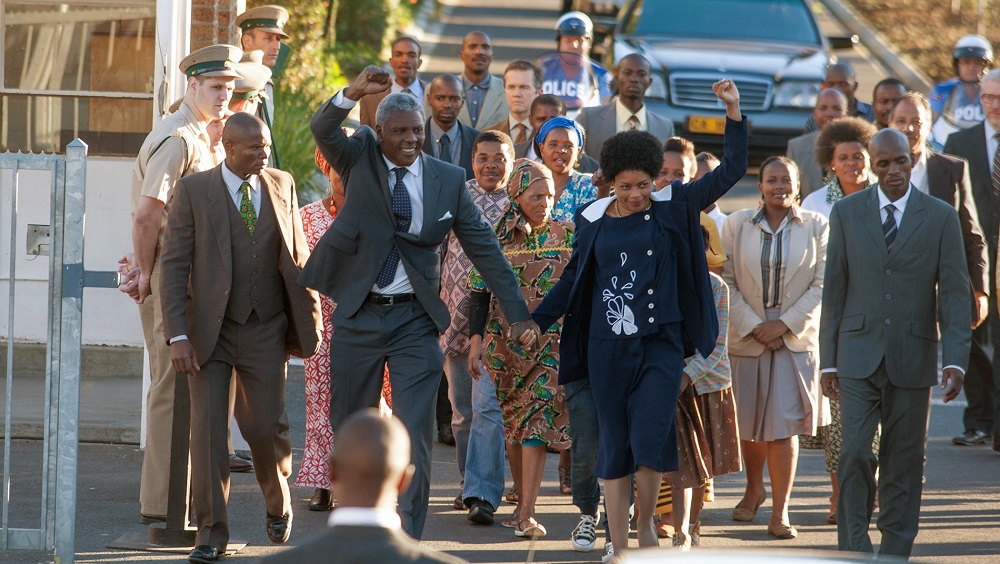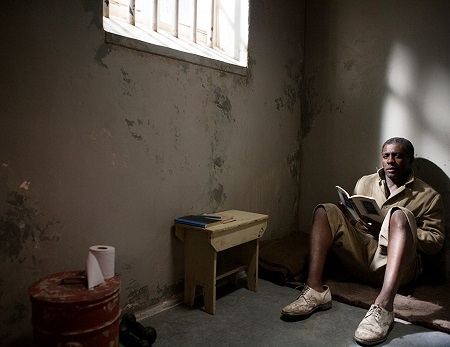
Mandela: Long Walk to Freedom (2013)
by Sara Michelle Fetters - December 25th, 2013 - Movie Reviews
Elba’s Genius Makes Mandela a Walk Worth Taking
In some ways it is surprising that it has taken someone so long to adapt Nelson Mandela’s 1994 autobiography for the big screen. In others, with recent events being what they have been, it just seems right that the movie version, directed by Justin Chadwick (The Other Boleyn Girl), with a screenplay by William Nicholson (Shadowlands, Gladiator), is hitting screens now. With the passing of the South African leader, looking back on the events that transformed him into one of the 20th century’s most indelible and important icons feels essential, a complex man of this magnitude deserving of every bit of examination and appreciation that can be thrown his way.
Yet, even with that being so reviewing Mandela: Long Walk to Freedom is still something of a difficult proposition. It’s impossible to look at the film outside of current events, hard to let it work on its own and not have reactions colored by what has recently transpired. Watching it I admit to having moments of trouble severing my personal opinion and respect for the man from the movie made about the first two-thirds of his life, forcing me to watch it twice in order to make sure my judgments weren’t being clouded by external factors.
What conclusions have I come to in regards to the subsequent motion picture? Mandela: Long Walk to Freedom is a good movie. It is not, sad to say, a great one. And that’s okay, Chadwick and Nicholson putting together a fetching biography that goes from points A to B to C with relative ease. Better, it’s extremely well acted by stars Idris Elba and Naomie Harris, the former dominating with a suitably commanding performance that is as intimately complex as it is suitably larger than life.
The central crux follows Mandela’s (Elba) path from smalltime lawyer, to leader in the African National Congress, to prisoner on Robben Island, to his release 26 years later to see Apartheid end and his own election as South Africa’s Prime Minister. It depicts his first marriage as it comes apart at the seams, his striving for peaceful resistance and his romance and marriage to Winnie Madikizela (Harris) all of which leads to their eventual disagreements on how best to proceed with their political efforts after his release from prison. The film covers as much as it can cram into a 140 or so minutes, emphasizing as many elements of this great man’s life as possible all of which means some of aspects of it can’t help but come up just a tiny bit short. There’s just too much to cover, and as such not every piece is as comforting or as well thought out as I honestly hoped they would be.
Yet film is professionally composed and put together, the Chadwick following a relatively old school template echoing in many ways Richard Attenborough’s Gandhi. But there comes a point where things can feel more like historical Cliff’s Notes than an actual in-depth discussion and dissection of an extremely complicated man’s life and times. Things move from one event to the next with relative matter-of-fact simplicity, the director trying so hard to maintain an observational distance the inherent dramatics of certain situations become sadly muted in the process.
But Elba is so dang good, delivering an effectively nuanced portrait of Mandela that’s spellbinding. He fearlessly doesn’t allow this man to become a saint, making sure to portray his flaws and positive attributes in equal light. This allows him to become more of a titanic heroic figure in the process. There are points where I felt I was really getting to know Mandela in ways I never could have dreamt of beforehand, certain scenes striking me silent with their powerful, emotionally knotty content. Elba handles everything thrown his way magnificently, slipping into the well-known world leader’s skin with fascinating conviction.
The sequences in Robben Island arguably work best, and I loved how Chadwick and Nicholson augment things of apparently little import only to subtly allow them to grow in power and magnitude. The sense of isolation, a feeling of being ripped out of the world and placed in the middle of a corrosive, inhuman desert is uncomfortably realized with fervent sensitivity during this portion, so by the time Mandela’s daughter visits for the first time as a teenager the effect it ended up having upon me was absolutely shattering.
I’m not sure what to add. Mandela: Long Walk to Freedom is a handsome picture, made with obvious care by those both behind and in front of the camera. But it never comes alive with the same fiery, charismatic intensity equal to the figure whose life story it is attempting to tell, and as such I was kept at something of an emotional distance for a substantial portion of the running time. Yet Elba is magnificent, and the power of Mandela’s story is undeniable, and while this biography is not quite what it potentially could have been, what it actually ends up being is thankfully more than enough to satisfy.
– Review reprinted courtesy of the SGN in Seattle
Film Rating: 3 (out of 4)








